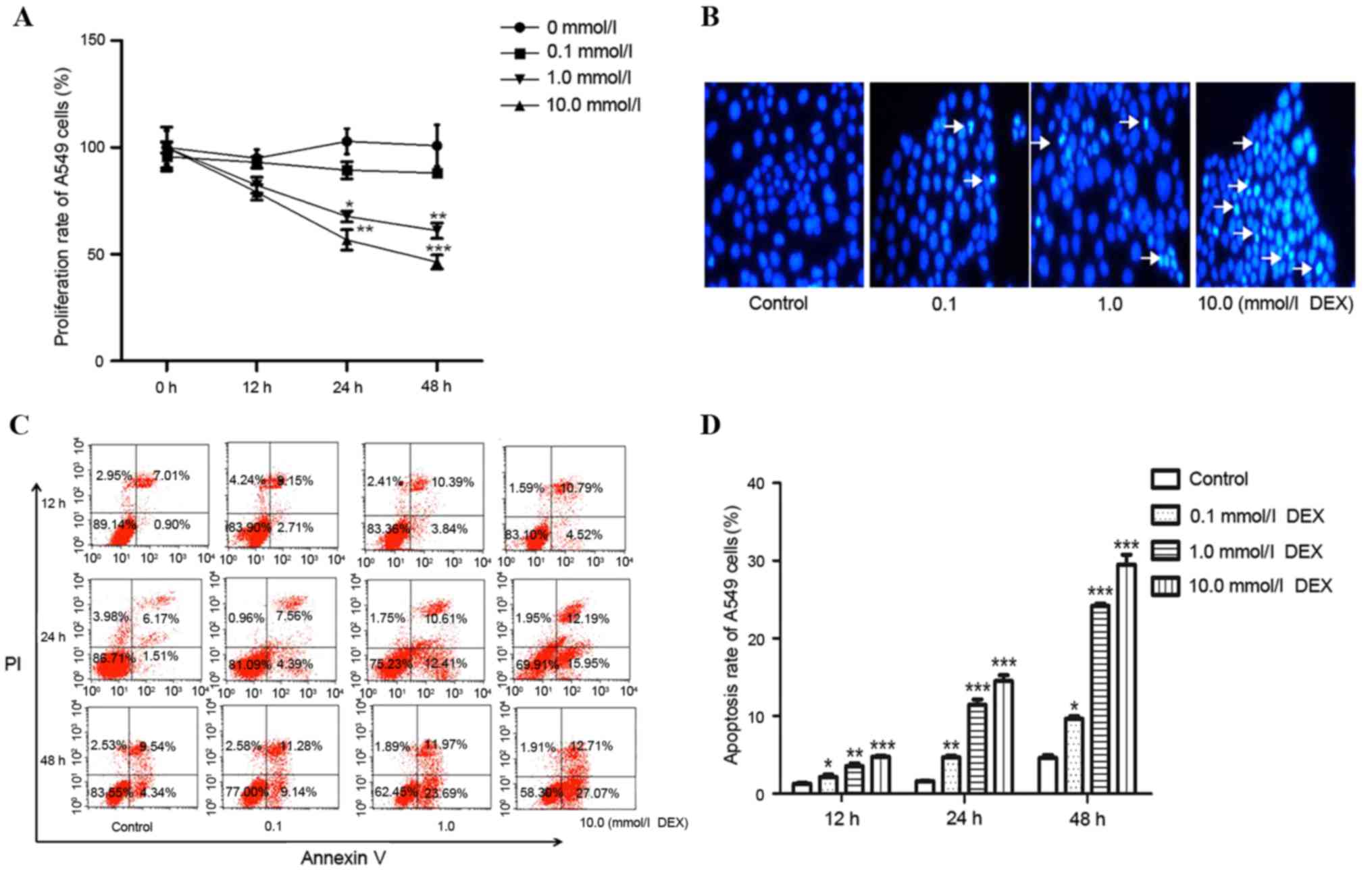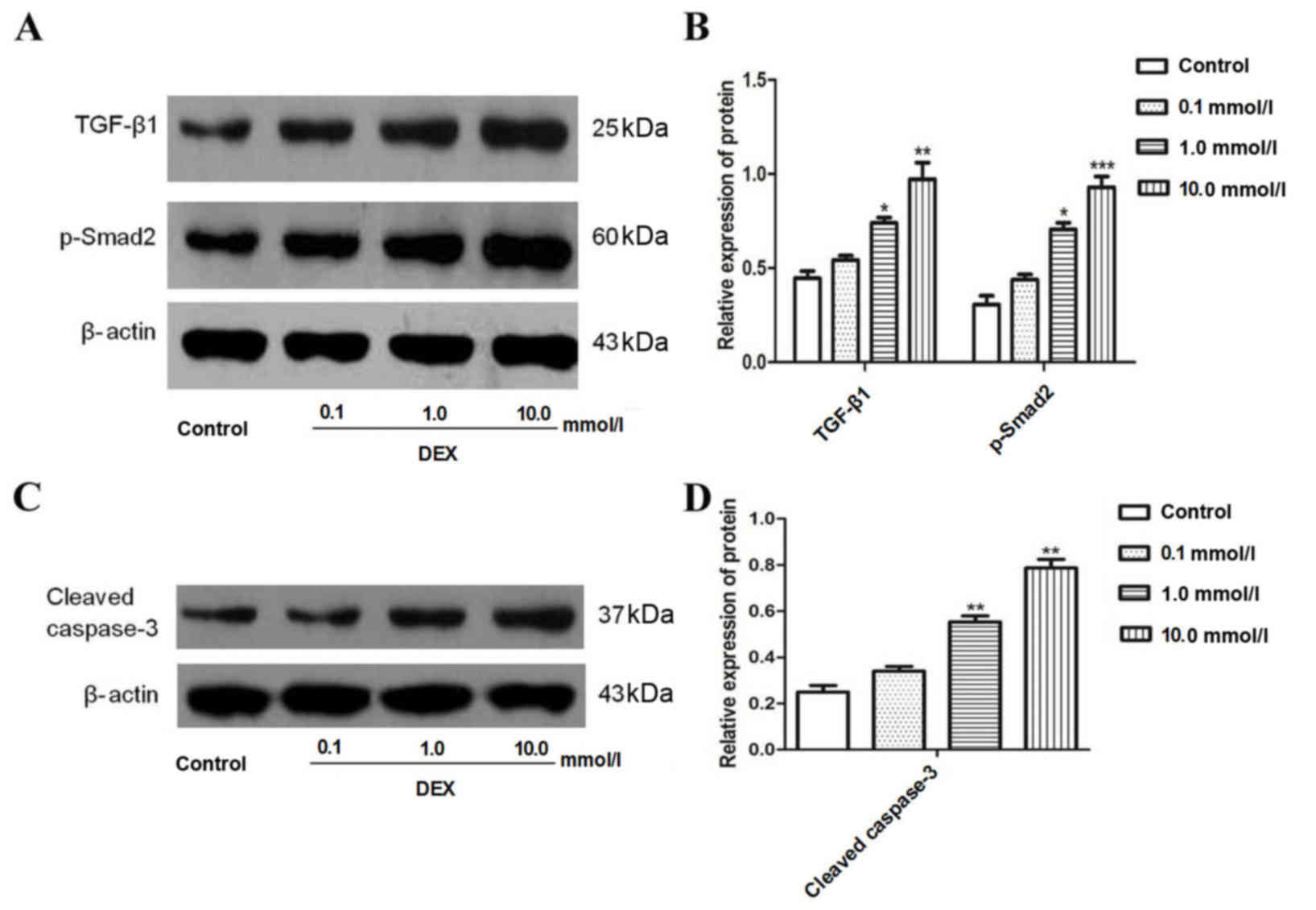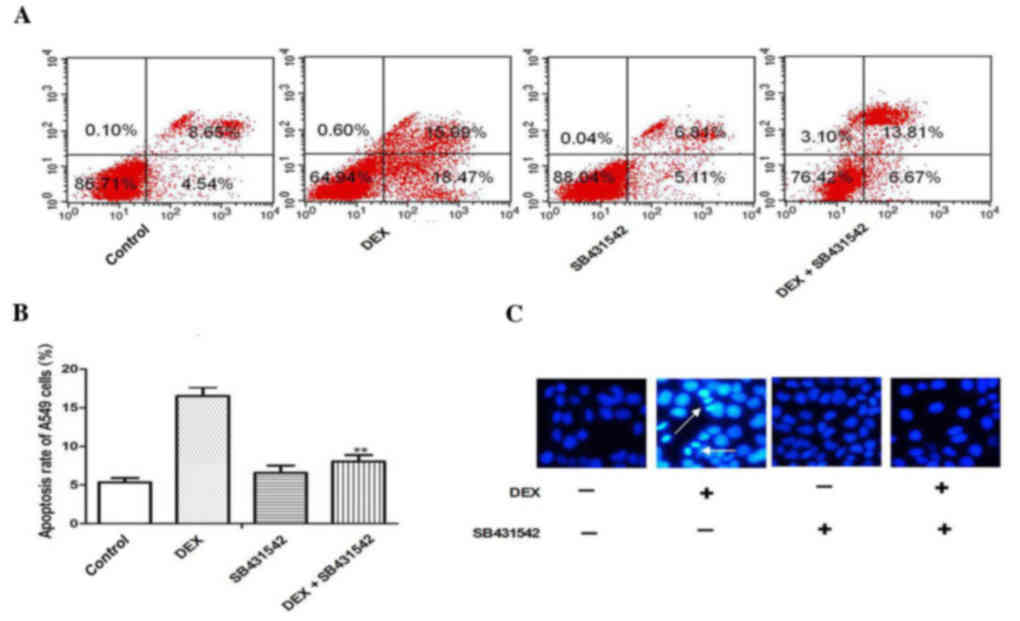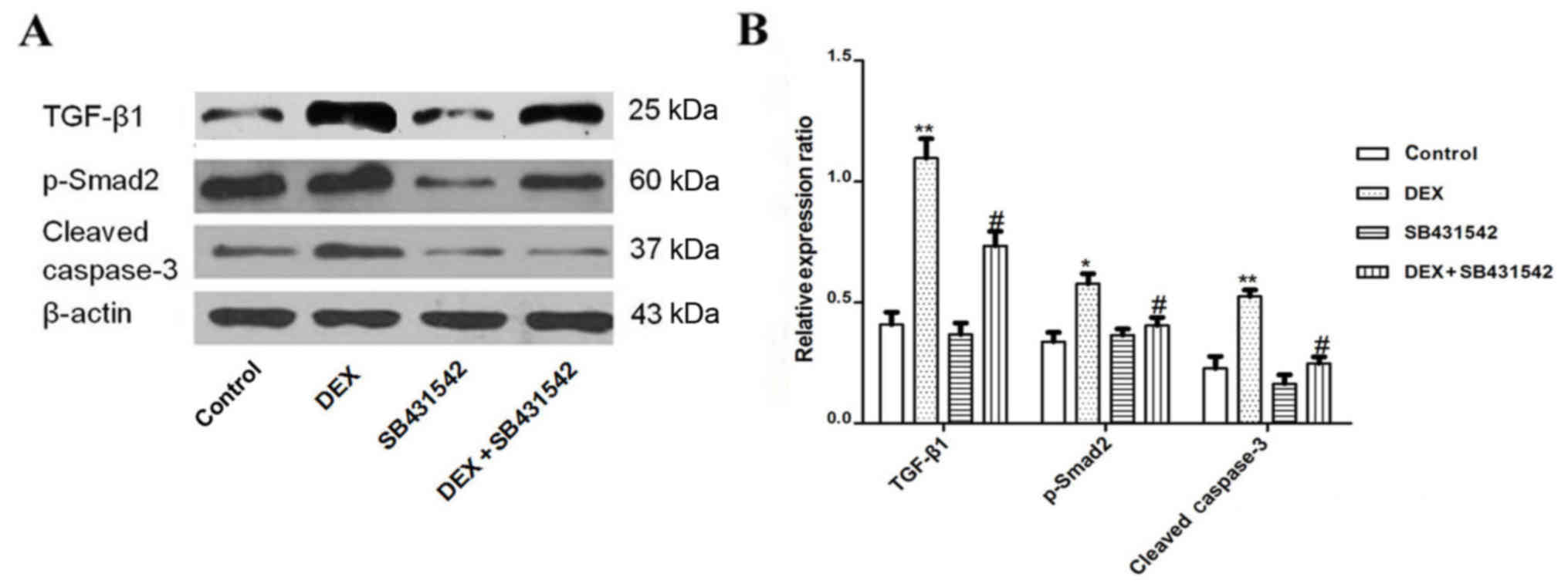|
1
|
Islami F, Torre LA and Jemal A: Global
trends of lung cancer mortality and smoking prevalence. Transl Lung
Cancer Res. 4:327–338. 2015.PubMed/NCBI
|
|
2
|
Ingawale DK, Mandlik SK and Patel SS: An
emphasis on molecular mechanisms of anti-inflammatory effects and
glucocorticoid resistance. J Complement Integr Med. 12:1–13. 2015.
View Article : Google Scholar : PubMed/NCBI
|
|
3
|
Choksi A, Sarojini KV, Vadnal P, Dias C,
Suresh PK and Khandare J: Comparative anti-inflammatory activity of
poly (amidoamine) (PAMAM) dendrimer-dexamethasone conjugates with
dexamethasone-liposomes. Int J Pharm. 449:28–36. 2013. View Article : Google Scholar : PubMed/NCBI
|
|
4
|
Kim JH, Hwang YJ, Han SH, Lee YE, Kim S,
Kim YJ, Cho JH, Kwon KA, Kim JH and Kim SH: Dexamethasone inhibits
hypoxia-induced epithelial-mesenchymal transition in colon cancer.
World J Gastroenterol. 21:9887–9899. 2015. View Article : Google Scholar : PubMed/NCBI
|
|
5
|
Zheng Y, Izumi K, Li Y, Ishiguro H and
Miyamoto H: Contrary regulation of bladder cancer cell
proliferation and invasion by dexamethasone-mediated glucocorticoid
receptor signals. Mol Cancer Ther. 11:2621–2632. 2012. View Article : Google Scholar : PubMed/NCBI
|
|
6
|
Chauhan D, Li G, Podar K, Hideshima T,
Neri P, He D, Mitsiades N, Richardson P, Chang Y, Schindler J, et
al: A novel carbohydrate-based therapeutic GCS-100 overcomes
bortezomib resistance and enhances dexamethasone-induced apoptosis
in multiple myeloma cells. Cancer Res. 65:8350–8358. 2005.
View Article : Google Scholar : PubMed/NCBI
|
|
7
|
Rinehart J, Arnold S, Kloecker G, Lim A,
Zaydan MA, Baeker T, Maheshwari JG, Carloss H, Slone S, Shelton B,
et al: Phase II randomized trial of carboplatin and gemcitabine
with or without dexamethasone pre-treatment in patients with Stage
IV non-small cell lung cancer. Cancer Chemother Pharmacol.
71:1375–1383. 2013. View Article : Google Scholar : PubMed/NCBI
|
|
8
|
Geng Y, Wang J, Jing H, Wang HW and Bao
YX: Inhibitory effect of dexamethasone on Lewis mice lung cancer
cells. Genet Mol Res. 13:6827–6836. 2014. View Article : Google Scholar : PubMed/NCBI
|
|
9
|
Jang YH, Shin HS, Sun Choi H, Ryu ES, Jin
Kim M, Ki Min S, Lee JH, Kook Lee H, Kim KH and Kang DH: Effects of
dexamethasone on the TGF-β1-induced epithelial-to-mesenchymal
transition in human peritoneal mesothelial cells. Lab Invest.
93:194–206. 2013. View Article : Google Scholar : PubMed/NCBI
|
|
10
|
Bolkenius U, Hahn D, Gressner AM,
Breitkopf K, Dooley S and Wickert L: Glucocorticoids decrease the
bioavailability of TGF-beta which leads to a reduced TGF-beta
signaling in hepatic stellate cells. Biochem Biophys Res Commun.
325:1264–1270. 2004. View Article : Google Scholar : PubMed/NCBI
|
|
11
|
Javelaud D, Alexaki VI, Dennler S,
Mohammad KS, Guise TA and Mauviel A: TGF-β/SMAD/GLI2 signaling axis
in cancer progression and metastasis. Cancer Res. 71:5606–5610.
2011. View Article : Google Scholar : PubMed/NCBI
|
|
12
|
Johansson J, Berg T, Kurzejamska E, Pang
MF, Tabor V, Jansson M, Roswall P, Pietras K, Sund M, Religa P and
Fuxe J: MiR-155-mediated loss of C/EBPβ shifts the TGF-β response
from growth inhibition to epithelial-mesenchymal transition,
invasion and metastasis in breast cancer. Oncogene. 32:5614–5624.
2013. View Article : Google Scholar : PubMed/NCBI
|
|
13
|
Kakudo N, Kushida S, Suzuki K, Ogura T,
Notodihardjo PV, Hara T and Kusumoto K: Effects of transforming
growth factor-beta1 on cell motility, collagen gel contraction,
myofibroblastic differentiation, and extracellular matrix
expression of human adipose-derived stem cell. Hum Cell. 25:87–95.
2012. View Article : Google Scholar : PubMed/NCBI
|
|
14
|
Xu Y, Yang S, Huang J, Ruan S, Zheng Z and
Lin J: Tgf-β1 induces autophagy and promotes apoptosis in renal
tubular epithelial cells. Int J Mol Med. 29:781–790.
2012.PubMed/NCBI
|
|
15
|
Miao ZF, Li WY, Wang ZN, Zhao TT, Xu YY,
Song YX, Huang JY and Xu HM: Lung cancer cells induce senescence
and apoptosis of pleural mesothelial cells via transforming growth
factor-beta1. Tumour Biol. 36:2657–2665. 2015. View Article : Google Scholar : PubMed/NCBI
|
|
16
|
Zheng RP, Bai T, Zhou XG, Xu CG, Wang W,
Xu MW and Zhang J: Lefty A protein inhibits TGF-β1-mediated
apoptosis in human renal tubular epithelial cells. Mol Med Rep.
8:621–625. 2013. View Article : Google Scholar : PubMed/NCBI
|
|
17
|
Bai L, Yu Z, Wang C, Qian G and Wang G:
Dual role of TGF-β1 on Fas-induced apoptosis in lung epithelial
cells. Respiratory Physiol Neurobiol. 177:241–246. 2011. View Article : Google Scholar
|
|
18
|
Liu Z, Xue L, Liu Z, Huang J, Wen J, Hu J,
Bo L and Yang R: Tumor necrosis factor-like weak inducer of
apoptosis accelerates the progression of renal fibrosis in lupus
nephritis by activating SMAD and p38 MAPK in TGF-β1 signaling
pathway. Mediators Inflamm. 2016:89864512016. View Article : Google Scholar : PubMed/NCBI
|
|
19
|
Yang J, Wahdan-Alaswad R and Danielpour D:
Critical role of Smad2 in tumor suppression and transforming growth
factor-beta-induced apoptosis of prostate epithelial cells. Cancer
Res. 69:2185–2190. 2009. View Article : Google Scholar : PubMed/NCBI
|
|
20
|
Zhang L, Lei W, Wang X, Tang Y and Song J:
Glucocorticoid induces mesenchymal-to-epithelial transition and
inhibits TGF-β1-induced epithelial-to-mesenchymal transition and
cell migration. FEBS Lett. 584:4646–4654. 2010. View Article : Google Scholar : PubMed/NCBI
|
|
21
|
Zhang Z, Wu L, Wang J, Li G, Feng D, Zhang
B, Li L, Yang J, Ma L and Qin H: Opposing effects of PI3K/Akt and
Smad-dependent signaling pathways in NAG-1-induced glioblastoma
cell apoptosis. PLoS One. 9:e962832014. View Article : Google Scholar : PubMed/NCBI
|
|
22
|
Koćwin M, Jonakowski M, Przemęcka M, Zioło
J, Panek M and Kuna P: The role of the TGF-SMAD signalling pathway
in the etiopathogenesis of severe asthma. Pneumonol Alergol Pol.
84:290–301. 2016. View Article : Google Scholar : PubMed/NCBI
|
|
23
|
Miyazaki M, Ohashi R, Tsuji T, Mihara K,
Gohda E and Namba M: Transforming growth factor-beta 1 stimulates
or inhibits cell growth via down- or up-regulation of p21/Waf1.
Biochem Biophys Res Commun. 246:873–880. 1998. View Article : Google Scholar : PubMed/NCBI
|
|
24
|
Yang N, Zhao B, Rasul A, Qin H, Li J and
Li X: PIAS1-modulated Smad2/4 complex activation is involved in
zinc-induced cancer cell apoptosis. Cell Death Dis. 4:e8112013.
View Article : Google Scholar : PubMed/NCBI
|
|
25
|
Kidd M, Schimmack S, Lawrence B, Alaimo D
and Modlin IM: EGFR/TGFα and TGFβ/CTGF signaling in neuroendocrine
neoplasia: Theoretical therapeutic targets. Neuroendocrinology.
97:35–44. 2013. View Article : Google Scholar : PubMed/NCBI
|
|
26
|
Sánchez-Capelo A: Dual role for TGF-beta1
in apoptosis. Cytokine Growth Factor Rev. 16:15–34. 2005.
View Article : Google Scholar : PubMed/NCBI
|
|
27
|
Penafuerte C and Galipeau J: TGF beta
secreted by B16 melanoma antagonizes cancer gene immunotherapy
bystander effect. Cancer Immunol Immunother. 57:1197–1206. 2008.
View Article : Google Scholar : PubMed/NCBI
|
|
28
|
Zhang L, Yu Z, Muranski P, Palmer DC,
Restifo NP, Rosenberg SA and Morgan RA: Inhibition of TGF-β
signaling in genetically engineered tumor antigen-reactive T cells
significantly enhances tumor treatment efficacy. Gene Ther.
20:575–580. 2013. View Article : Google Scholar : PubMed/NCBI
|
|
29
|
Glick AB: TGFbeta1, back to the future:
Revisiting its role as a transforming growth factor. Cancer Biol
Ther. 3:276–283. 2004. View Article : Google Scholar : PubMed/NCBI
|
|
30
|
Liu Y, Gao W and Zhang D: Effects of
cigarette smoke extract on A549 cells and human lung fibroblasts
treated with transforming growth factor-beta1 in a coculture
system. Clin Exp Med. 10:159–167. 2010. View Article : Google Scholar : PubMed/NCBI
|


















